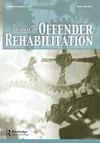Developing social capital through postsecondary correctional education
IF 1.1
Q3 SOCIAL WORK
引用次数: 4
Abstract
Abstract This study examines the connection between participation in higher education programs in prison and the development of social capital. Interviews were conducted with eighteen formerly incarcerated participants enrolled in higher education programs while incarcerated. Findings suggest that participants developed self-efficacy, hard and soft skills, and connections to positive social networks through taking part in a postsecondary correctional education program. Participants noted an expansion of their self-awareness and improved communication skills that facilitated their mostly successful pursuits of employment opportunities after being released. The findings of this study also suggest that the outcomes of higher education programs in prisons extend beyond classroom learning and academic achievement in a way that provides students with knowledge, useful skills, prosocial networks, and access to employment prospects upon reentry into the community. More specifically, this study details how postsecondary correctional education programs provide a foundation for building social capital and preparing incarcerated individuals to become employable, law-abiding citizens. That this information came from formerly incarcerated individuals who are now thriving postrelease warrants further research that would support the expansion of educational programming for prisoners.通过中学后矫正教育发展社会资本
摘要本研究探讨了监狱服刑人员参与高等教育与社会资本发展之间的关系。采访了18名曾经被监禁的参与者,他们在监禁期间参加了高等教育项目。研究结果表明,参与者通过参加中学后矫正教育项目,发展了自我效能感、软硬技能和积极的社会网络联系。与会者指出,他们的自我意识有所提高,沟通技巧也有所提高,这有助于他们在获释后成功地寻找就业机会。这项研究的结果还表明,监狱高等教育项目的成果超越了课堂学习和学术成就,为学生提供了知识、有用的技能、亲社会网络,并在重返社区后获得了就业前景。更具体地说,本研究详细说明了中学后矫正教育项目如何为建立社会资本提供基础,并使被监禁的人成为可就业的守法公民。这些信息来自出狱后正在茁壮成长的前囚犯,值得进一步研究,以支持扩大对囚犯的教育计划。
本文章由计算机程序翻译,如有差异,请以英文原文为准。
求助全文
约1分钟内获得全文
求助全文
来源期刊

Journal of Offender Rehabilitation
SOCIAL WORK-
CiteScore
1.60
自引率
0.00%
发文量
24
期刊介绍:
The Journal of Offender Rehabilitation is a multidisciplinary journal of innovation in research, services and programs in criminal justice and corrections. The journal is an essential professional resource for practitioners, educators and researchers who work with individuals involved in the criminal justice system and study the dynamics of rehabilitation and individual and system change. Original research using qualitative or quantitative methodology, theoretical discussions, evaluations of program outcomes, and state of the science reviews will be considered.
 求助内容:
求助内容: 应助结果提醒方式:
应助结果提醒方式:


